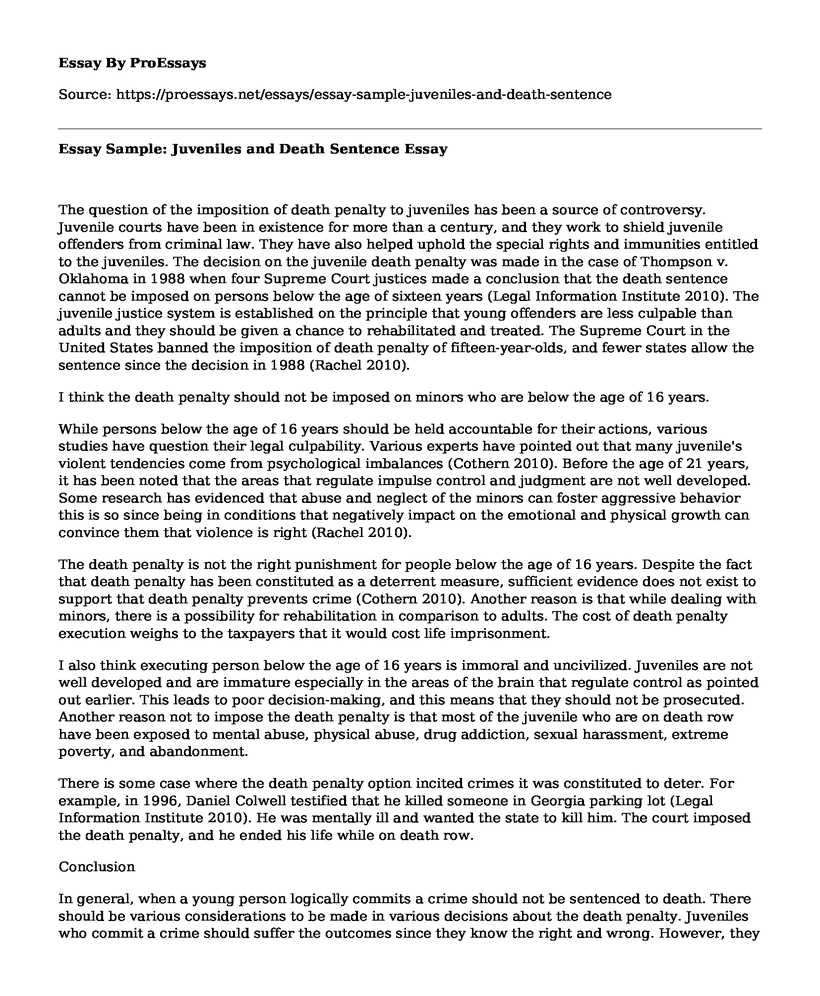The question of the imposition of death penalty to juveniles has been a source of controversy. Juvenile courts have been in existence for more than a century, and they work to shield juvenile offenders from criminal law. They have also helped uphold the special rights and immunities entitled to the juveniles. The decision on the juvenile death penalty was made in the case of Thompson v. Oklahoma in 1988 when four Supreme Court justices made a conclusion that the death sentence cannot be imposed on persons below the age of sixteen years (Legal Information Institute 2010). The juvenile justice system is established on the principle that young offenders are less culpable than adults and they should be given a chance to rehabilitated and treated. The Supreme Court in the United States banned the imposition of death penalty of fifteen-year-olds, and fewer states allow the sentence since the decision in 1988 (Rachel 2010).
I think the death penalty should not be imposed on minors who are below the age of 16 years.
While persons below the age of 16 years should be held accountable for their actions, various studies have question their legal culpability. Various experts have pointed out that many juvenile's violent tendencies come from psychological imbalances (Cothern 2010). Before the age of 21 years, it has been noted that the areas that regulate impulse control and judgment are not well developed. Some research has evidenced that abuse and neglect of the minors can foster aggressive behavior this is so since being in conditions that negatively impact on the emotional and physical growth can convince them that violence is right (Rachel 2010).
The death penalty is not the right punishment for people below the age of 16 years. Despite the fact that death penalty has been constituted as a deterrent measure, sufficient evidence does not exist to support that death penalty prevents crime (Cothern 2010). Another reason is that while dealing with minors, there is a possibility for rehabilitation in comparison to adults. The cost of death penalty execution weighs to the taxpayers that it would cost life imprisonment.
I also think executing person below the age of 16 years is immoral and uncivilized. Juveniles are not well developed and are immature especially in the areas of the brain that regulate control as pointed out earlier. This leads to poor decision-making, and this means that they should not be prosecuted. Another reason not to impose the death penalty is that most of the juvenile who are on death row have been exposed to mental abuse, physical abuse, drug addiction, sexual harassment, extreme poverty, and abandonment.
There is some case where the death penalty option incited crimes it was constituted to deter. For example, in 1996, Daniel Colwell testified that he killed someone in Georgia parking lot (Legal Information Institute 2010). He was mentally ill and wanted the state to kill him. The court imposed the death penalty, and he ended his life while on death row.
Conclusion
In general, when a young person logically commits a crime should not be sentenced to death. There should be various considerations to be made in various decisions about the death penalty. Juveniles who commit a crime should suffer the outcomes since they know the right and wrong. However, they do not have the ability to understand the grave consequences. I think real justice should not advocate a life for a life and especially that which has just begun.
References
Legal Information Institute. (2010). Death penalty. Legal Information Institute. Retrieved on February 2, 2017 from http://www.law.cornell.edu/wex/death_penalty
Cothern, L. 2010. Juveniles and Death Penalty. Coordination Council on Juvenile Justice and the Death Penalty.
Rachel, J. (2010). The elements of moral philosophy. New York: US. McGraw-Hill Publishers.
Cite this page
Essay Sample: Juveniles and Death Sentence. (2021, Apr 02). Retrieved from https://proessays.net/essays/essay-sample-juveniles-and-death-sentence
If you are the original author of this essay and no longer wish to have it published on the ProEssays website, please click below to request its removal:
- The Power of Ads: How Ads Influence Customer Choices - Essay Sample
- Essay Example on Forensic Science: A Study of DNA & Cell Structure Advancement
- Annotated Bibliography on Parental Trust: A Growing Issue in Society
- Essay Sample on Marriage & Health: Examining the Link Between Matrimony & Well-Being
- Essay Example on Battered Woman Defense and Social Issues
- Essay Sample on Ethical Decision-Making: Evaluating Choices and Their Consequences
- Social Location: Understanding Its Impact on Our Development - Essay Sample







